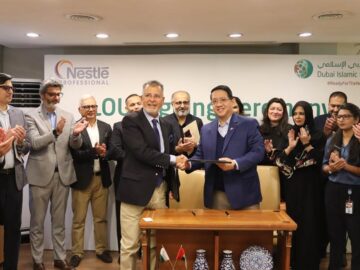
edotco Group, a leading integrated telecommunications infrastructure services company in Asia, launched a study in collaboration with Roland Berger titled, ‘Towering Above: Building Tomorrow’s Digital Infrastructure in Asia’. The study estimates that Tower Companies (TowerCos) can help Mobile Network Operators (MNOs) save up to US$10 billion through infrastructure sharing and result in cumulative savings of up to US$67 billion for consumers due to affordable 5G connectivity by 2025. Further, the study also shows that TowerCos can enable sustainable digital connectivity by reducing up to 17 million metric tonnes in carbon footprint by 2025.
The report, launched during a panel discussion featuring edotco, Roland Berger and the International Finance Corporation (IFC), explores the critical roles and potential impact of TowerCos across nine key Asian markets – Malaysia, Indonesia, Thailand, Bangladesh, Pakistan, the Philippines, Myanmar, Cambodia and Sri Lanka. The report also demonstrates how TowerCos are stimulating sustainable digital connectivity to realise incremental socio-economic benefits for industries, societies and governments, in addition to assessing how key policies and regulatory reform recommendations can unlock such opportunities.
TowerCos and MNOs must evolve symbiotically in the next normal
According to the report, digital infrastructure is becoming a critical digital economy enabler, with 5G expected to transform the industry. TowerCos are now transforming their roles to become digital infrastructure providers, in addition to working closely with industry stakeholders to undertake deeper forms of active infrastructure sharing. Not only are these services critical to stimulate development during the aftermath of the COVID-19 pandemic, but such partnerships are also crucial for preparing economies for the 5G era – an age that will further revolutionize network usage and unlock new opportunities while easing the MNOs’ investment and deployment challenges.
“While MNOs are rapidly expanding their network in low Average Revenue Per User (ARPU) markets such as Asia, they face a significant challenge in keeping their cost per GB under control while striving to meet the industry demands and adhering to regulators’ intended policy and regulatory outcomes. These can only be addressed sustainably through a higher degree of infrastructure sharing,” said Gayan Koralage, Director of Group Strategy, edotco Group.
The report also noted that – despite Southeast Asia and South Asia being among the fastest-growing sub-regions in terms of average data usage per user – MNOs have not been able to capitalise on the traffic trend. This is causing the continuous decline in ARPU, making it challenging for MNOs to generate returns that commensurate with their cost of capital.
“In overcoming the MNOs’ investment conundrums, solutions based on software-defined networking and a stronger partnership with next-generation TowerCos can foster greater scalability, speed and cost advantages. Such partnerships are rapidly unfolding in developed markets, showcasing the TowerCos’ emerging catalytic roles in business, society and the environment,” he added.
Regulatory reforms required to drive growth and multiply socio-economic benefits
The study further notes that leading TowerCos are poised to assist MNOs by moving up the value chain. Namely, this is by offering innovative 5G-enabled solutions such as OpenRAN, Network-as-a-Service solutions and Edge Computing to help MNOs achieve greater cost- and network-efficiency.
“Given today’s telecommunications industry dynamics, TowerCos must evolve to become active digital infrastructure providers to provide the needed industry scalability, efficiency and flexibility. However, the right regulatory environment is needed with five policy reforms critical to power growth: strong digital infrastructure mandate, conducive licensing & ownership regime, active promotion of infra sharing, streamlined process and enablement of adjacent services.,” stated Damien Dujacquier, Managing Partner of SEA, Roland Berger.
The study notes that forward-looking regulatory reforms and policy changes are needed for TowerCos to realise their potential in the next normal. These include providing incentives and introducing a more conducive regulatory framework for TowerCos to explore more innovative partnerships and services.










